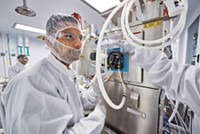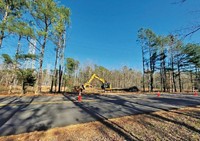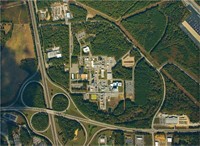Advertisement
Grab your lab coat. Let's get started
Welcome!
Welcome!
Create an account below to get 6 C&EN articles per month, receive newsletters and more - all free.
It seems this is your first time logging in online. Please enter the following information to continue.
As an ACS member you automatically get access to this site. All we need is few more details to create your reading experience.
Not you? Sign in with a different account.
Not you? Sign in with a different account.
ERROR 1
ERROR 1
ERROR 2
ERROR 2
ERROR 2
ERROR 2
ERROR 2
Password and Confirm password must match.
If you have an ACS member number, please enter it here so we can link this account to your membership. (optional)
ERROR 2
ACS values your privacy. By submitting your information, you are gaining access to C&EN and subscribing to our weekly newsletter. We use the information you provide to make your reading experience better, and we will never sell your data to third party members.
Outsourcing
Pharmaceutical services firm Resilience debuts, with questions
New company pitches itself as a disruptive engineering services firm in biopharmaceutical manufacturing
by Rick Mullin
November 25, 2020
| A version of this story appeared in
Volume 98, Issue 46

Resilience, a venture-backed biopharmaceutical manufacturing services firm, has made its debut with an announcement of $800 million in the bank, a roster of highly-accomplished leaders, and an intent to develop “powerful new technologies” that will define the future of therapeutics.
The company’s stated goal is to be a first-of-its-kind provider of manufacturing services for cutting-edge biologics, including cell and gene therapies, viral vectors, vaccines, and proteins. Some industry watchers, though, see it as just another contract development and manufacturing organization (CDMO), albeit a high-tech one.
“We created Resilience to reimagine biopharmaceutical manufacturing through unprecedented investment in technology and a best-in-class team to execute our vision,” says Robert Nelsen, managing director at Arch Venture Partners, which led a recently closed series B financing round that netted approximately $750 million. “COVID-19 has exposed critical vulnerabilities in medical supply chains,” continues Nelsen, founder of Resilience and chairman of its board.
Nelsen says current manufacturing can’t keep up with the pace of breakthroughs in research and the public’s need for critically important drugs. “We are committed to tackling these huge problems with a whole new business model,” Nelsen says. The firm makes a comparison to Amazon Web Services, the leading cloud-computing services provider.
As a first step, Resilience has acquired Therapure Biopharma, a biologics services firm in Mississauga, Ontaro, that observers say has been for sale for 3 years. It also purchased an undisclosed protein-based therapy-manufacturing operation in the US, Resilience CEO Rahul Singhvi says. Both deals were closed in October.
In addition, Singhvi says the firm has laboratory space in place in San Diego and a pending deal for lab space in Boston. The company plans to add two more manufacturing sites to its network in 2022. Resilience plans to establish a network of approximately 10 facilities with expertise in biological drug development, says Singhvi, former CEO of the vaccine maker Novavax.
Industry observers say Resilience appears to be at a preliminary stage in launching a CDMO with the ambition of scaling it up rapidly to the size of large players like Thermo Fisher Scientific and Catalent. Peter Bigelow, president of xCell Strategic Consulting and a former executive with Patheon—a drug services firm that is now part of Thermo Fisher—suggests a more precise comparison can be made to the cell- and gene-therapy service companies—Brammer Bio and Paragon Bioservices—that Thermo Fisher and Catalent acquired, respectively, in 2019.
Bigelow is intrigued by the long list of industry luminaries associated with the company. Patrick Y. Yang, former executive vice president of technical operations at Roche/Genentech, is vice chairman of the board. Other board members include Susan Desmond-Hellman, former CEO of the Bill & Melinda Gates Foundation; Scott Gottlieb, former commissioner of the US Food and Drug Administration; and Frances Arnold, Nobel Laureate and professor of chemical engineering, bioengineering and biochemistry at the California Institute of Technology.
Singhvi insists that Resilience is taking an approach different from that of conventional CDMOs by developing affordable production technologies for new biopharmaceutical modalities and providing early-stage research as well as manufacturing services.
“We aren’t waiting for customers to give us a menu and say, ‘This is how we do it. Can you make it for us?’” Singhvi says. “We are already active in the space. So when they come to us, we may know more about how to make their drug than they do.” The company is not interested in merely adding to the drug manufacturing base by becoming another CDMO, Singhvi says. “If we become like that, then we’ve failed."
Caltech’s Arnold tells C&EN that the new firm is addressing an emerging unmet need. “The development of new therapies will be limited by the availability and cost of manufacturing,” she says. “If you were able to make serious advances in manufacturing technology, then you could enable these therapies to come to many more people.”
Bigelow says he will be watching with interest. “If they want to take a blank sheet of paper on these hugely expensive CAR-T and cell and gene therapy products and say there’s probably a way to step back and figure out how to process these in a more efficient way—if they are going to do that kind of engineering and invest in that kind of basic research, it could pay dividends,” he says.





Join the conversation
Contact the reporter
Submit a Letter to the Editor for publication
Engage with us on Twitter